The latest season of FX’s vampire comedy What We Do in the Shadows follows one of the protagonists, 500-year-old Nadja of Antipaxos, as she sets out to achieve her dream of opening a vampire nightclub. While certain of her struggles are specific to the realm of undead — installing and maintaining blood sprinklers, plying wraiths with mystical narcotics in exchange for their remodeling labor — others will be familiar to any business owner who has ever had a transformative vision for their space.
You don’t have to be undead, in other words, to hanker for some proper nightlife. If anything, your customers probably do, as well. In the post-Covid restriction world, more and more operators are reimagining their restaurants as event spaces, taking advantage of people's renewed interest in coming together for comedy, dance parties, special classes, trivia nights, and whatever else they can dream up to entertain one another. Working from home gives everyone cabin fever. Lockdowns have a long hangover. Give folks an excuse to mingle out in the world and they'll probably take it.
As a neighborhood restaurateur, creating occasions is definitely your lane, with huge upside. But it’s also going to take effort to wrangle performers, hosts, staff, and guests. Tech will be part of that, along with diplomacy skills, creativity, and a sense of humor for the inevitable fiascos that huge crowds invite. Read on to learn more about how you can take your consumer events to the next level, safe in the knowledge that no wraiths were harmed in the making of this guide.
Why should your restaurant host events?
It’s no secret that the events biz, like the restaurant and hospitality industry more broadly, suffered a massive hit during the pandemic. While virtual and hybrid events are here to stay, studies indicate that people are really itching to gather in person. In-person dining has seen a major comeback, and, anecdotally, many operators say that demand for private parties has skyrocketed.
Amanda Gross, the director of events at the NYC-based Sunday Hospitality Group, which operates several locations, including all-day New American eatery Sunday in Brooklyn and the Japanese-inspired Rule of Thirds, said requests for contracted events are almost double their pre-pandemic levels. “Everyone is clamoring to have their wedding after two years of restrictions, and the attendance at these events is astonishing,” she told us. “I’d say 75% of our customers are coming to us saying they have nearly 100% attendance, because everyone wants to come out and party.”
Restaurant groups like Sunday Hospitality are now capitalizing on the togetherness trend by hosting their own ticketed events. Brian Evans, the beverage director at Sunday, describes these special events as a business card: “Hosting something for the community, like comedy or music, pulls in guests that might not otherwise have thought of dining with you,” he said. In an industry with infamously low margins, a robust events lineup can provide a predictable revenue stream while simultaneously securing your reputation as a destination for customers, distinguishing your establishment in a sea of options.
What kinds of events should your restaurant host?
Trivia, wine tastings, watch parties, speed dating, oh my! You can take two angles on this eternal question of what, exactly, you should host. One tack is to figure out what kinds of events will appeal to your current customer base — or the customer base you’re hoping to attract. “The first thing I do when I come into a venue is scope out what the neighborhood is doing,” Gross said. “It’s not that I want to do what everyone else is doing, but it’s helpful to know what other venues are doing to bring people in. If there’s a comedy show two blocks down, I’ll go sit for a show and figure out how we could execute and ideally improve upon that concept. I also do research on social media to see what captures folks in the area.”
The other way into the question is to figure out who among your existing staff or connections has the most talent or hustle, and set them up to succeed on your behalf. Elena Laurenti, a career bartender based in Brooklyn, recommends first consulting with your loyal, and often multitalented, employees. “A lot of people working in the service industry are musicians themselves, which means they have access to a network you wouldn’t necessarily otherwise be able to draw upon,” she said. “They tend to skew young, too, so many of them have a really solid understanding of social media. And they’re already in-house, so you can trust them to share the best connections. Because they work for you, they’re invested, and they want to see you raise your game and make money.”
The homegrown approach to talent-seeking also helps to ensure the event runs smoothly. “One of our bartenders at Rule of Thirds hosts their own drag show, Kanpai Drag, every month,” Evans said. “It’s been a raving success — such a blast. And because the host is a bartender, they usually come up with the drinks programming.” When your employee doubles as your emcee and your menu consultant, it’s that much easier to make sure everyone is on the same page about event specifics.
Okay, but, bottom-line: What sorts of events bring in crowds, and where will you get the most return for your investments of time, money, and reputation? The can’t-miss options for restaurants, Gross said, are traditionally live music, comedy, wine pairings, and private tastings. (She would know: She’s spent her entire career in the industry, beginning at the ONE Group fresh out of college before migrating to the Freehand Hotels, and eventually to Sunday.) The caveat here, of course, is that you should put up events that are good. You can swing a pillowcase in the West Village and hit a decent stand-up comedian, a fierce drag-queen emcee, and a PhD student who could host a hilarious science-nerd night. If you're reading this from Spokane or Fargo or Macon, work with what you have at hand. Lean into your local strengths.
And don’t be afraid to be creative. Laurenti, who recently left a long-time job for a position at an omnivorous Brooklyn venue called the Bell House, said a previous employer of hers stagnated because it simply wouldn’t branch out beyond live music. “The Bell House puts on all sorts of different events — podcast recordings, dance parties, movie screenings — and I think the variety serves them tremendously,” she said. It’s easier to capture multiple audiences when your events calendar mashes up book release parties, improv, mid-sized touring acts, political fundraisers, live game shows, and whatever else gets a niche group hyped to show up and get their wrists stamped. “So much of the audience my old employer relied upon moved out of the city during Covid, or they stopped coming because they’re still taking precautions,” Laurenti said. “At the same time, there are so many new people moving to Manhattan, and we’re still just in the beginning stages of figuring out what appeals to that demographic. There is no bigger mistake you can make in the events world than being stuck in a past that’s irrelevant.”
How do you staff for a big event at your venue?
As you’re wheeling through the gamut of oddball events, figuring out whether you’re now a low-key Magic: The Gathering bar or a budding open-mic karaoke hotspot, you’re bound to hit a plethora of little snags. One you’ll have to manage closely is getting your staffing levels correct — an ongoing test for everyone in the industry.
“Staffing is a tremendous obstacle right now,” Evans said. “You should have your best people working events, and it’s very challenging to find seasoned workers right now because a lot of people left the restaurant industry during the pandemic.” Sunday’s solution? Using outside staffing agencies during their special events.
Evans stressed that this is more of a stopgap than a silver bullet: “Bringing somebody new who doesn’t know the ins and outs of your venue means you’re constantly training,” he said. “Some of these events get locked in just under a week’s notice; the agencies can usually do a rush job with about 48 hours' notice, but you don’t really have time to train the way you want, so then during the event you’re potentially dealing with a dozen outsourced people constantly asking you where everything is. Once, we hired bartenders through a particular agency. It became very obvious when the event was in full swing that they had effectively never bar-tended before.”
In short, staffing agencies can be just as hit-or-miss as any business. If you hire one that misses, keep going down the list until you find ones that deliver as promised, and stick with those.
Hiring and scheduling can be trickier than a calculus midterm under ordinary circumstances. During events, you’re contending with additional variables. It’s always wise to get a headcount (more on reservation and ticketing platforms below), information that you’ll have to contextualize with the particular type of event you’re hosting. A hundred RSVPs is 100 RSVPs, but your scheduling will still depend in part on whether those RSVPs are for a Harry Potter trivia night, a Super Bowl party, a Super Mario Kart tournament, or an over-50 singles mixer.
Will guests be ordering off your regular menu, or are you offering a shorter menu for the occasion? Do you need to bring in your star mixologist on her day off, or do you just need a 22-year-old who knows how to crack a cold beer and swipe a credit card? Rule of Thirds, for example, is able to minimize bar staffing during its monthly Kanpai Comedy events by offering house-canned cocktails instead of a full bar. In general, when it comes to crewing the bar, Laurenti favors a leaner-than-average roster for events. “As long as your bartenders have high-volume experience, you can get away with understaffing a bit,” she said. “Any service industry worker will tell you that it’s better to be understaffed than to be overstaffed. If you’re sharing the bar with four other bartenders and you’re all splitting tips evenly, that’s going to reduce the amount of money they’re making, without necessarily reducing your workload. It’s a too-many-cooks situation, and everybody gets real salty.”
Prepare for your talent to go totally sideways
Not every event will involve a performer, but most will, in some fashion. Most of them will be perfectly professional. Others, partly by dint of having an ego sufficient to get in front of a room full of strangers, will possess their own unique internal physics, timekeeping abilities, and rituals. Be prepared to accept and accommodate their quirks with the same equanimity and grace you exhibit when dealing with your everyday clientele, as well as your weird, wonderful work family. Stars really are just like us, and your staff should be instructed to show the local children’s magician all the respect and deference they give the Grammy-winning diva passing through on a cross-country tour.
Of course, respect and deference have their limits, especially when performers materialize at 5:30 for a 10 p.m. sound check. “That’s my biggest pet peeve — when I’m up to my elbows in prep and they’re just wandering around the venue for four-and-a-half hours,” Laurenti said. “Recently, I was working somewhere and an artist showed up early and decided to go downstairs and start setting up. She asked the chef to help her set up the stage and bring her water — it was shocking. My manager had to tell her that we had that space reserved for someone else at that time. She was so taken aback at the notion that we weren’t just at her beck and call. After her show, she and all her friends were just hanging around and getting hammered. We had to open the downstairs for the midnight dance party, and they refused to leave until one of them got sick. It was amateur hour across the board.”
Naturally the occasional nightmare is familiar territory in hospitality. When it comes to events, forethought and clear communication will make most potential trainwrecks mere hiccups. Noise levels, for instance, are a potential snafu that can usually be avoided with smart planning. “At Rule of Thirds, we’ve run into sound bleed issues; when we host private events, sometimes the DJ wants to turn it up, but we have to put our foot down because we have regular customers dining just on the other side of the wall,” Evans said. “In those cases, it’s better to manage the expectations of the host upfront and lay out specific parameters of what the DJ can and can’t do.”
Events of all kinds can get rowdy, whether that looks in practice like an especially zealous MC blasting “Turn Down for What” at wake-the-dead levels at 4 am, or (as Laurenti witnessed) overindulgent friends-of-the-talent treating the public sidewalk like a toilet. So think ahead and do some real-life war gaming here. Is this an event that is going to smoke weed underneath your landlord’s window? Show up messy and aim to get downright sloppy? Bray at jet-engine volume during 8am World Cup games? Be a good neighbor, whatever you’re inviting into the neighborhood. “Your business exists in community,” Evans said. “You want to be pillars of your community, and you don’t want to ruffle any feathers.”
What kind of software can help you pull off restaurant events?
It’s 2022, and we’d be remiss if we didn’t take a moment to highlight some of the tech tools helping restaurateurs plan and execute events sans tears and garment-rending. For ticketed events, Gross recommends advertising on Resy, primarily because it functions both as a reservations platform and an events marketing tool. “If I’m a customer who’s trying to book a regular reservation at a particular restaurant, I go on this platform and I see all the special events advertised on the same page,” she said. “I can get a ticket for the event and then book a dinner reservation for right after, all in the same place.”
Another great customer-facing feature of Resy is the ability to search for “Special Events and Experiences” by distance. Eventbrite works much the same way; your soon-to-be guests can search by location and event type (Music, Hobbies, Food & Drink, etc.) and further narrow their results by tag. (Pro tip: #dating, #holiday_events, and #hookah seem to trend fairly often.) Eventbrite offers tiered pricing; with each package, the platform takes a cut of each ticket sold, but it may be worth it for the perks (such as fundraising integrations and attendee info collection tools) as well as the advertising. Resy, which also operates on a tiered model, charges a flat fee every month. If you’re in the market for software that also does general reservations, especially at high volume, it’s a strong pick.
For planning and logistics, two frontrunners are Tock and Tripleseat. Tock, a consumer event platform built specifically for restaurants, allows users to create and manage both seated and “general admissions” events, streamlines guest check-in and communications, and offers basic CRM functionalities. Gross, who manages both ticketed and private BEO events, prefers Tripleseat for its versatility: “Tripleseat is my lifeline. It’s my everything. I can’t imagine working in this industry without it.” Tripleseat simplifies the contract process at the heart of the private events industry and offers a detailed yet preternaturally user-friendly calendar that really stands out. Both Tock and Tripleseat also double as events marketplaces, so investing in one of these platforms means you can opt out of the Eventbrite/Resy rat races, unless you’ve got cash to burn on blanket marketing.
Of course, the granddaddy of mass advertising is free, and literally at your fingertips. “You have to be promoting on social media,” Laurenti said. “Do you have an Instagram? Do you have a TikTok? You could have a podcast for the venue, you could do livestreams. If a certain performer is there, are they doing their own promotion? Ask them to tag you in their posts!” You’re now in the business of getting more people to be more social, after all. If you can come up with a way to make this stuff fun for you and your staff, your throngs of appreciative visitors are sure to agree.
[Photo by Brett Sayles via Pexels]





